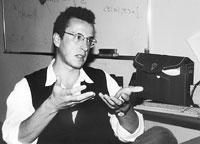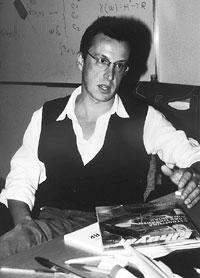Enrike Zuazua, in the math wave
He was born 34 years ago in Eibar. Until the time of attending the University he studied in the same place. Later, in 1979 he moved to the Leioa campus, where he had the opportunity to get to know mathematics closely. From then on, he chose numerical analysis, an option that has been maintained working on Applied Mathematics and especially on the equations in Partial Derivatives. Thanks to a scholarship granted by the Basque Government, he completed a doctorate course in Paris.

When she told us about this time, Basauriana María Jesús Esteban, currently a professor at the Paris-Dauphin University and the French CNRS, asked us to emphasize the help provided, as well as the advice and support received in the Department of Mathematics of Leila. And we do so. In fact, the year 1984 was decisive and the possibilities that were then given are the first step of the next route.
Thanks to this, he did his thesis and worked for four years in Paris. To follow the steps that followed you have to go at full speed from one place to another: The Leioa Campus of the University of the Basque Country, the Autonomous University of Madrid and since the year 90 became professor of the Conplutense of Madrid. Yes reader, you have not read it wrong. Enrike Zuazua is only 34 years old.
Zetiaz-Elhuyar: It is often said that there are lists of “honor” among mathematicians. Is it difficult to contact people of this status?
Enrique Zuazua: In mathematics, as in other areas of life, you have to let yourself know if you want to get where there is information. This means that you have to be informed of what you are doing constantly and to get it you cannot stay in your office. You have to dress up, know the information sharing channels and learn how to use them. Entropy leads you to close in your head and in the nearest community and the fight against this risk must be done consciously. Of course, we talk about mathematics, but I think that this reflection serves all areas of life or science.
N-D: However, the image of mathematicians is not so...
R. Zuazo: Of course! For many people, mathematicians are theoreticians who work alone in their small classrooms, but the reality is totally different. On the one hand, the mathematician is not a “mad scientist” who lives outside of everyday life and real needs. For example, most of the works that come to our department have a practical origin: we mathematically analyze the practical problems posed by physicists or engineers. And on the other hand, we also need a group, like the rest of researchers; if today you want to do something deep in mathematics, teamwork is fundamental, because that forces you to constantly expose your ideas to others. This update enriches the theories and works themselves and takes steps to create a solid network of information exchange. If not, how to understand the work of the mathematician?
N-D: He continually uses the words of mathematician and researcher. Do you not consider the mathematical binomy and the teacher?

R. Zuazo: Of course! Mathematician, or scientist, to better understand is researcher and professor, insofar as he has to carry both activities at once. And not only does it suit me, but it seems fundamental to me, because being able to bring together the two great aspects of one's own formation is an enormous luxury. On many occasions we have discussed this, but I think that you can no longer make that cast. In the US, for example, its educational and research model is based on the fact that research and teaching have long been complementary. We still hear something about it, but I think those issues are being overcome. If I wonder about my personal experience, I will tell you that the means to work your ideas and theories are treated thanks to teaching, and then you can put that theory bare to students through research. I think that researchers are increasingly limiting themselves to teaching and although until recently it was thought that it was a kind of punishment, I will not give away, but I think it is accepted with pleasure.
N-D: Globally, mathematics is a dynamic field. In other words, do you know mathematicians?
R. Zuazo: We know each other constantly. Until recently, the main meeting points were the congresses held at the international level, which we still largely met, but which, having new resources, are not so necessary. You can be anywhere through email or internet services and chat with anyone without leaving your office computer. Contrary to what people believe, many mathematical congresses are organized around the world. Obviously, they do not study mathematics in its entirety and deal with very specific issues, in some cases too concrete.
Even if it seems a lie, among the congresses that are organized in our field you have to choose if you do not want to spend half your life by plane. Participating in these congresses gives you the opportunity to exchange information, leading the research. In fact, the concerns of all researchers are transmitted in these forums and allow the collection of information. However, this need has declined considerably in recent years. As mentioned above, email has opened up new ways of information exchange to channel the work we do mathematicians. Before it was a one-month process, contacting another mathematician, explaining your concerns and receiving your answer, but today they happen almost in real time: you don't have to wait for a letter, you can almost receive the answer as soon as you ask the question.
These new information exchange resources have also fostered equality. He has facilitated contact with a mathematician from India: The Indian professional no longer has to go to the USA to publicize his work. Although this aspect has not yet been properly analyzed, the scientific revolution that new computer media can generate in developing countries is a very interesting topic. Next time, if you want, we can talk about it, but now I have to attend my doctorate course...
Buletina
Bidali zure helbide elektronikoa eta jaso asteroko buletina zure sarrera-ontzian











